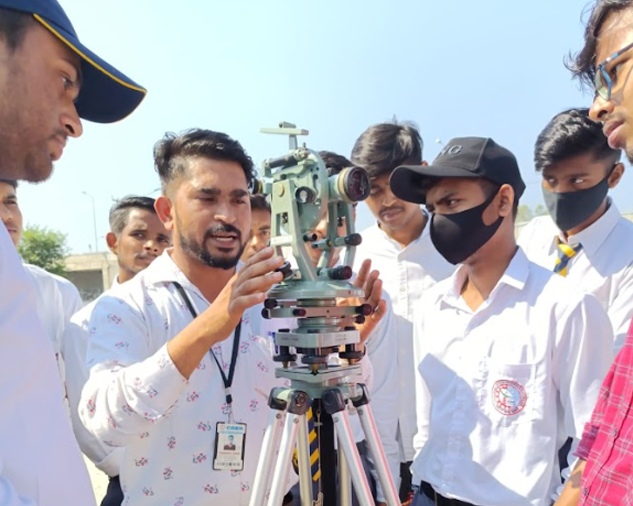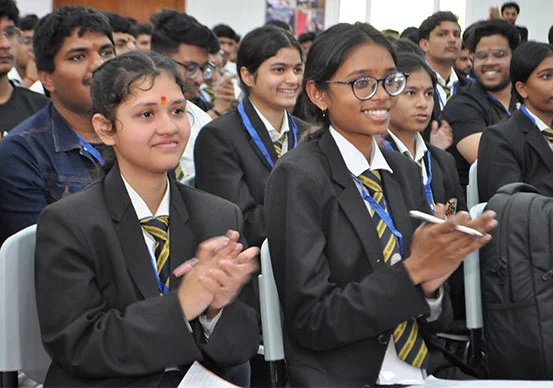
B.A. (Hons.) Journalism and Mass Communication (BAJMC)
Duration
4 year
Eligibility Criteria
Have passed Senior School Certificate Examination (10+2 System) or equivalent Examination with at least 50% marks in aggregate for General Category & 45% marks in aggregate for SC/ST Category

The College of Media Studies at COER University offers UG, PG and Doctoral programs designed to equip students with cutting-edge skills in journalism, digital media, and communication. With a focus on hands-on learning and industry collaborations, our graduates are prepared to excel in the dynamic media landscape, fostering creativity and critical thinking.
Curriculum
-
Introduction to Print Journalism
-
Introduction to Mass Communication
-
Introduction to Hindi Journalism
-
DSE-1*
-
Hindi Communication (AEC-1)
-
Print Journalism Lab (SEC-1)
-
Environmental Studies (VAC-1)
-
Photojournalism
-
Reporting for Print Media
-
Editing for Print Media
-
DSE-2*
-
Computer Applications (AEC-2)
-
Computer Applications-Lab (AEC-2)
-
Photojournalism Lab (SEC-2)
-
OTT and New Media (VAC-2)
-
OTT and New Media-Lab (VAC-2)
-
Radio Production
-
Film Production
-
Film Appreciation
-
DSE-3*
-
University Open Elective
-
Summer Internship-1
-
English Communication (AEC-3)
-
Film Production Lab (SEC-4)
-
Sports Journalism (VAC-3)
-
Sports Journalism-Lab (VAC-3)
-
Television Production
-
Media Law and Ethics
-
Digital Media Technology
-
DSE-4*
-
University Open Elective
-
Television Production Lab (SEC-4)
-
Mobile Journalism (Minor Track)
-
Advance New Media
-
International Communication
-
DSE-5*
-
University Open Elective
-
Summer Internship-2
-
Advance New Media Lab (SEC-5)
-
Multimedia Journalism
-
Event Management
-
Digital Journalism
-
DSE-6*
-
University Open Elective
-
Multimedia Production Lab (SEC-6)
-
Media Literacy
-
Media Research
-
Ethics in Research
-
DSE-7*
-
University Open Elective
-
Summer Internship-3
-
Data Journalism
-
Development Communication
-
Intercultural Communication
-
University Open Elective
-
Dissertation
Career Path
Unlock diverse career avenues in construction and infrastructure with a Diploma in Media Studies such as.
- Print Media
- Electronic Media
- New Media
- Corporate Communication & Public Relations
- Event Manager
- Photographer & Videographer
- Environmental Technician
- Film/Television Industry
- Radio Jockey (RJ)

Program Objectives POs
-
Quality Knowledge
Impart quality knowledge related to journalism and mass communication.
-
Professional Excellence
Prepare graduates for successful careers in mass communication and media by fostering professional excellence.
-
Creativity and Innovation
Develop graduates with creative and innovative abilities to tackle evolving challenges in the media industry.
-
Global Competence
Facilitate an understanding of sustainability in the media environment, ensuring global competence.
-
Real-Life Skills
Equip students with practical skills to navigate real-world media scenarios.
-
Ethics and Leadership
Train graduates in professional ethics, leadership, and lifelong learning opportunities.
Program Specific Outcome PSOs
-
PSO 1
Graduates will demonstrate practical skills in various forms of media production, including print, broadcast, digital, and multimedia platforms. They will be adept at using industry-standard tools and technologies to create, edit, and distribute content effectively.
-
PSO 2
Graduates will exhibit advanced capabilities in journalistic writing and reporting, producing clear, accurate, and engaging content across multiple formats. They will understand the principles of newsworthiness, storytelling, and ethical reporting.
-
PSO 3
Graduates will be able to critically analyze and evaluate media content, communication strategies, and media impacts. They will understand the role of media in society, including issues related to media ethics, law, and the influence of media on public opinion.
-
PSO 4
Graduates will possess strong verbal and written communication skills, enabling them to interact effectively with diverse audiences, sources, and stakeholders. They will be skilled in public speaking, interviewing, and crafting persuasive messages.
-
PSO 5
Graduates will be equipped to plan, manage, and execute media campaigns and communication strategies. They will understand the principles of media planning, audience analysis, and the use of various media channels to achieve strategic communication goals.
Program Educational Objectives PEOS
-
PEO 1
To impart media skills required for making a successful journalist.
-
PEO 2
Students will be trained and equipped to serve in the modern media industry.
-
PEO 3
Students will get the opportunity to learn new media in India’s first digital college.
FAQs
A: The Bachelor of Journalism and Mass Communication (BAJMC) is a degree program that prepares students for careers in media, journalism, and communication. It typically requires around 120 credit hours for BAJMC Degree without Honors (3 Years) and 180 credit hours to award Honors (4 Years).
A: BJMC programs cover a wide range of topics related to media, communication, and journalism. Areas of study can include digital media, broadcast news, innovation and entrepreneurship, audience engagement, social media, investigative reporting, public relations, and Spanish-language media.
A: Yes, many BJMC programs emphasize hands-on learning experiences. Students may have opportunities for prestigious internships, immersive learning, and capstone projects. For example, at ASU’s Walter Cronkite School of Journalism and Mass Communication, students can report the evening news on Arizona PBS and create digital advertising campaigns.
A: BAJMC programs allows students to choose a second major, certificate, or minor in addition to their journalism and mass communication program. This additional specialization allows students to explore other fields of interest.
A: Yes, high-performing students may have the option to apply for an accelerated master’s degree program. These programs allow students to complete both a bachelor’s and master’s degree in as few as five years. Accelerated master’s options may include areas like Digital Audience Strategy, Investigative Journalism, Mass Communication, or Sports Journalism.
List of Value-Added / Skill Enhancement / Ability Enhancement Courses
| Subject Code | Name of Subject |
|---|---|
|
|









